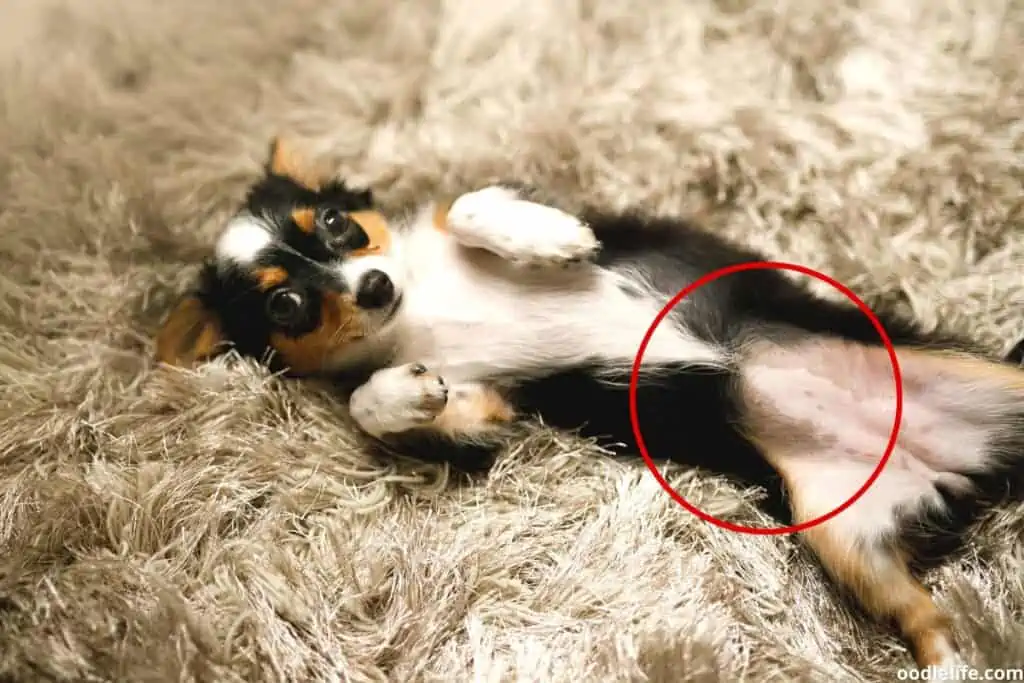Why Does My Dog Dig on My Bed?
Having a dog is one of life’s greatest joys but can also lead to stress. You might be tempted to worry whenever your pup does something new or unexpected. Is that normal, or is it a sign of something more?
You may even ask yourself, “Why does my dog dig on my bed?”
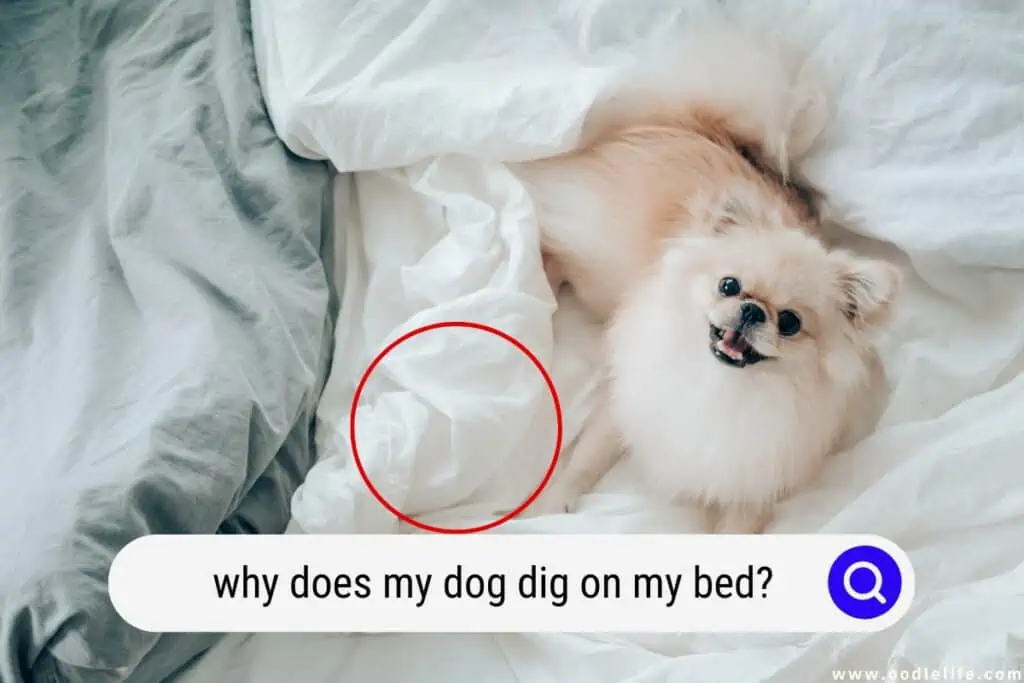
Dogs can dig on a bed because of instinct, anxiety, or curiosity. Often, they search because they are trying to get comfortable and arrange the pillows well, or they want to make this bed their own. Either way, it’s a natural response and usually nothing to worry about.
If your dog is digging in your bed, it could be many reasons. However, you shouldn’t worry too much about it. Instead, watch for other warning signs. If you can figure out the reason behind your dog’s sudden digging habits, you should be able to take the next step to help them stop.
8 Reasons a Dog Might Dig Into the bed
The reason your dog might be digging on your bed is just that dogs dig. It’s part of their nature, as anyone with multiple dogs (and therefore holes in their yard) can tell you. However, sometimes there’s a bit more to it, so it may be time to think about what your pup is trying to say to you with their actions.
Here are the eight most common reasons to answer “Why does my dog dig on my bed?” If you see any accompanying warning signs of one of these, you can decide what’s best for you to do about it. In some cases, it’s enough to know why the dog is digging and train them out of it.
Other times, a dog needs help from a professional.
Instinct
The most common reason that your dog may dig on your bed is instinct. Thousands of years ago, when dogs were wild, they would have to find safe places to sleep. Often, this would involve digging a shallow hole in the ground, as working sled dogs in the north still do to this day.
If your dog is digging before sleep, they are likely following their instincts. This digging is accompanied by turning around in circles and repeatedly sitting. It’s normal and nothing to worry about.
However, if you don’t want your dog digging at the blankets or pillows, you can train them away from the habit.

Communication
Although instinct is strong, some dogs want to communicate by digging. If they only dig when you are around or under the blankets, there’s a good chance that your pup is trying to get under the covers with you or get your attention in some way. A super snuggly dog will do this when it’s time for bed, and it’s not easy to access the edge of the blanket.
Although this is an adorable and endearing move, it’s not always the best for blanket and pillow health. You can train your dog to communicate in a different way by giving them an easy way into the bed or not allowing them underneath if they dig. This one is all about training.
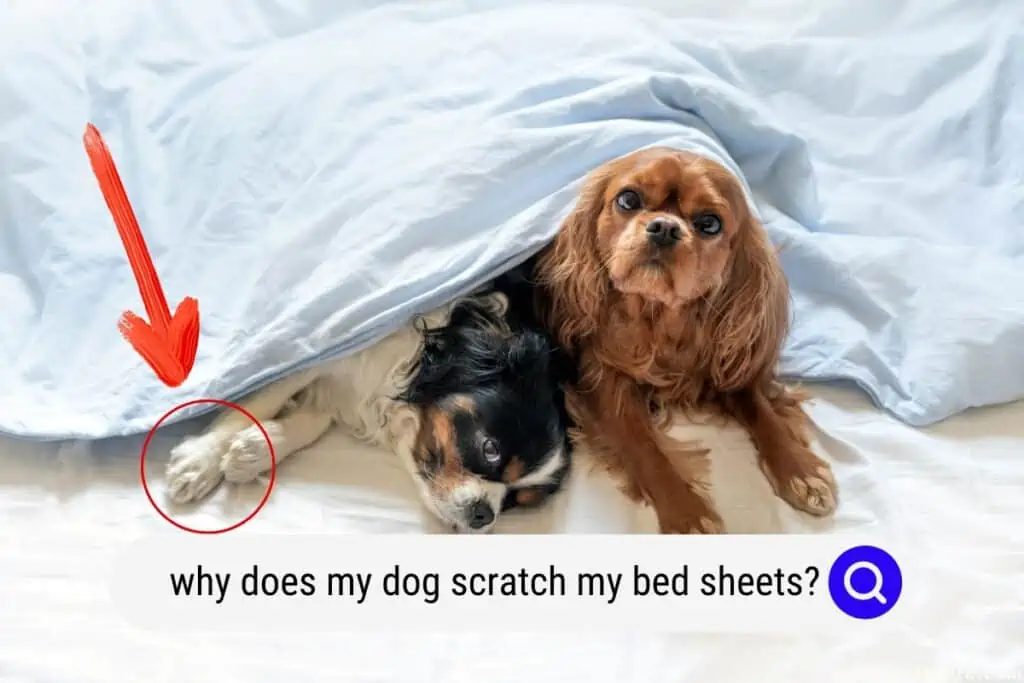
Territorial
Dogs mark their territories in more ways than the traditional. If your dog is digging at their blankets and pillows or your blankets and pillows, no matter how often you replace them, they are likely marking the bed as their own to prevent other dogs from laying claim to either the bed itself or you.
These moves are understandable and pretty instinctual for a dog, but they aren’t necessarily healthy for a dog’s boundaries (or, again, your pillows and blankets). You must stop your dog from marking things as its own, especially if you want to be the person who holds the perceived power in the relationship.
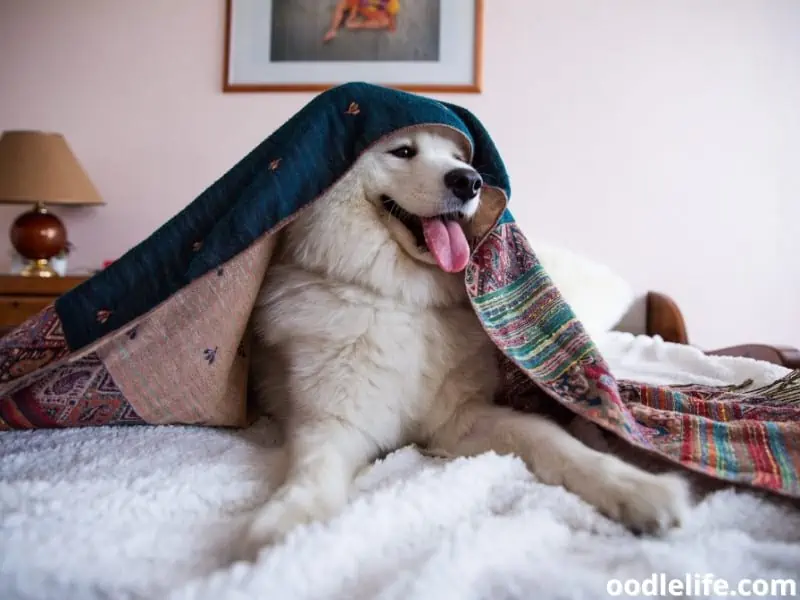
Curiosity
Of course, the answer can be much more simple than complex instincts. Dogs dig outside because it’s in their nature to try and find out what’s under the oil. If a bed looks diggable, they might wonder what is under the covers that could be worth finding.
A dog only knows how to look under something by digging.
Of course, curiosity is not a bad thing and will help your dog expand their mind and stay alert. However, you still don’t want your cushions or blankets ripped up because of it. If your dog seems curious about what’s under your covers, show them, and the curiosity might go away.

Anxiety
A common reason for dogs to do anything out of the ordinary is similar to humans: anxiety. This is especially true if your pup is from the shelter and hasn’t entirely adjusted to humans yet. They might dig at the covers out of anxiety, trying to find a safe place to hide from the new or overwhelming stimuli outside.
Anxiety is more common in dogs than you might think. It has many treatments, including veterinarian-prescribed medications and diets. If you are worried that your dog has anxiety, there are probably multiple ways your vet can help.
Contact a medical professional to deal with an anxious dog.

Safety
If your dog has a little anxiety, they might dig at the covers for safety. Being in an enclosed, small, warm place is a great way to make a dog feel safe, especially if they’ve slept there with you and felt safe with you. Other than talking to a vet, the most important thing you can do for an anxious pet is make sure they feel safe.
Once a pet is safe and happy, they generally won’t continue anxious behaviors until another trigger happens. You can also create a space that feels safe for your dog, so they won’t feel the need to dig until they feel safe on their own.
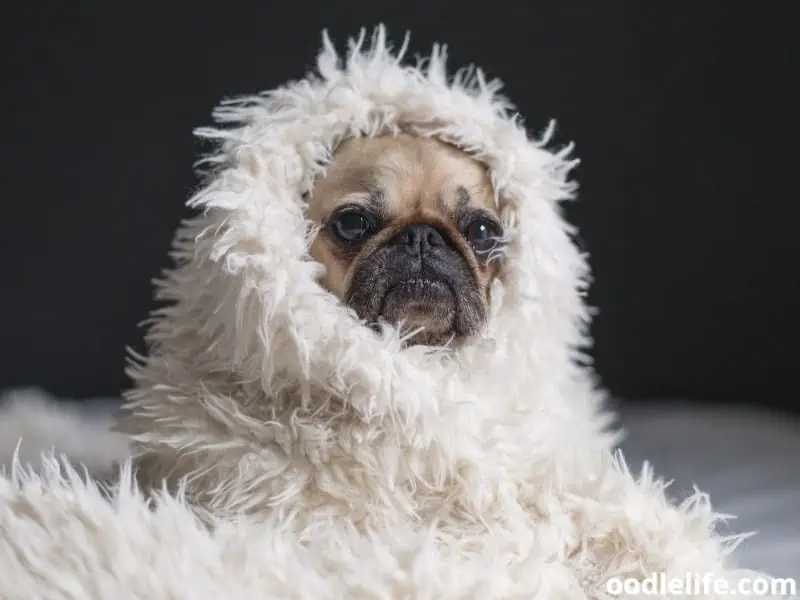
Comfort
Although anxiety and safety are crucial things to watch out for, they are not as common in dogs as more straightforward explanations. If you are concerned that your dog might have anxiety, speak to a vet and get a test if you can. However, know that sometimes, a dog wants to be comfortable and is digging to find the best position.
If a dog isn’t comfortable, they will try to adjust their space until they are comfortable. This usually involves digging, biting, or pushing things around with the nose before deciding to lay down. Dogs can get distracted by the process and keep digging even though their bed is perfect for them.

Nesting
The final reason a dog might be digging in your bed is that she’s pregnant and about to whelp. Now, this is a very specific situation because unless you have a pregnant momma dog near the end of her term, it doesn’t apply to you. However, nesting is a crucial step to look out for for a soon-to-be mother.
Look for signs of nesting, such as:
- Digging into the bed
- Gathering pillows or blankets
- Heavy panting
It may be time to prepare for babies. Take your pup to the pet or breeder and let a professional take care of the whelping.
How To Stop a Dog From Digging in the Bed?
A digging dog is a dog that is following ancestral instincts, bred into them from generations past. However, domesticated dogs shouldn’t dig everywhere, and it’s okay to want to train them. If your dog is searching and you want them to stop, here are some methods to try.
The most effective way is to train your dog to communicate in a different way. Whether they are trying to tell you that they need comfort, they are tired, or they want to play, there are better ways to communicate that. You don’t necessarily need a doggy word button board, but you can train your dog out of the habit.
Another method is to not allow your dog on the bed. As soon as your dog begins to dig, tell them to get down and say “no” firmly. This should train the dog that any time they search on your bed, they won’t be allowed to stay.
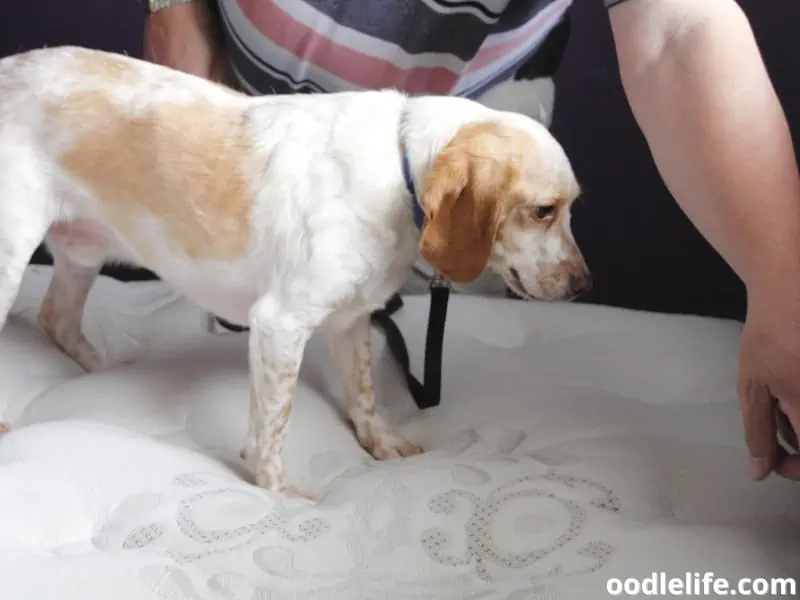
Final Thoughts
So, why does my dog dig on my bed? Whether your dog is digging on the bed because of anxiety, instinct, or just trying to get comfy, you can stop the habit by training a dog to communicate in another way by not allowing them on the bed. However, knowing that your dog is most likely following instinct will help you sleep easier at night (even if it means the destruction of a pillow or two).
